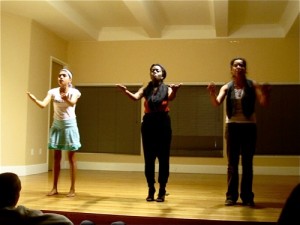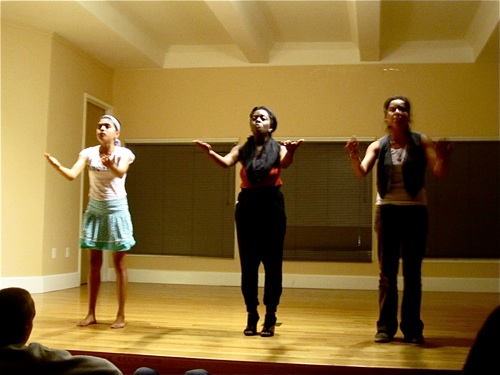Sometimes on a campus widely known for technology and science, it’s easy to overlook its vibrant, but at times lesser-known, arts community, particularly within the student body.

Cue the Spoken Word Collective, Stanford’s student-run poetry group. For the poets, the group is all about cultivating emotion and generating explosive written and spoken poetry.
A decade ago the collective didn’t exist. It wasn’t until 2002 that Mark Otuteye ’05 M.A.’06 founded the Spoken Word Collective because he felt as though poets needed a place to come together on campus.
“I think it’s a safe space for honest expression, whatever it may be,” said Raina Sun ’13, the director of the group. “Honestly, these types of spaces are rare.”
Since its founding, the collective has assumed a role as campus creative outlet, particularly for writers who feel as though their words are better suited for the stage as opposed to the page.
From hosting quarterly campus-wide shows, biweekly poetry workshops and open mics, to competing in the College Unions Poetry Slam, the largest poetry slam in the country (last year it placed fourth), the collective ensures that there are many opportunities to give student poetry a voice.
The quarterly shows, according to Alok Vaid-Menon ’13, a fourth-year member of the group, attract over 200 people. He says that the writing workshops are also very popular.
“Every year I coordinate an erotic poetry workshop in February called ‘Snap & Moan,’” Vaid-Menon said. “We invite the Stanford community to learn how to write and perform erotic poetry with us — it’s always a blast.”
Although the group puts on many events for the student community, there are only a few actual members of the collective. Last year there were 11, and this year there are a guaranteed eight so far, plus the new students they accept after auditions, which take place in the beginning of fall quarter. The auditions consist of poets of all different skill levels reading one original poem. After auditions, the collective must unanimously decide whom to accept into their organization.
“We accept poets who we believe can contribute something new or fresh to the group and grow as writers and performers with us,” said Vaid-Menon, “We also like to choose people who we know will vibe well socially with the group, because we do hang out a lot.”
Vaid-Menon says that over time, the group has become a close-knit bunch of friends who enjoy picnics, parties and exclusive bonding retreats. In addition to friendship, he feels as though the collective provides a place for nurturing a communal artistic growth.
“I’ve stayed an active member of Spoken Word these past three years because it gives me the progressive and artistic community I find lacking in a lot of other spaces at Stanford,” he said. “We try our best to use art as a form of social cohesion and transformation in our group.”
Another member of the group, Tina Miller ’14, agrees that the community aspect of the group is really what makes the collective special.
“We have some amazing people in the collective, and when we meet once a week, it’s a way of kind of checking in on each other,” Miller said. “Because otherwise the writing life can get lonely. We’re talking about the depths of our feelings here, both in poetry and in friendships — we bring it all to the table.”
Miller, along with other poets in the group, really appreciates what the collective has been able to offer her and her writing. Miller claims that another thing some of the members have in common is the way they write their poetry — by shaping their pieces around a particular message. She says that they can start with a specific topic and from there, write on command.
Miller, however, doesn’t find that method as easy as other members do. She says her writing routines vary tremendously.
“The only consistent aspect of my writing routine is that it’s wildly inconsistent,” Miller said, although she believes that poetry can turn out beautiful no matter what the method. “Ultimately, though, when poetry’s done right, its a little thrill, a little reminder that you’re living; it’s that much closer to the asymptote of the impossible.”
As far as the poets’ futures go, Miller doesn’t really know what poetry has in store for them. While all the members of the group love to write and perform, not all the poets intend to stick with it after graduation.
Regardless of the members’ ambitions after college, the collective plays a vital role in each member’s undergraduate experience.
Vaid-Menon notes that the group has more to offer than just the chance to share poetry.
“The Spoken Word Collective helps keep us grounded and focused and reminds us that we do have a voice,” he said.
